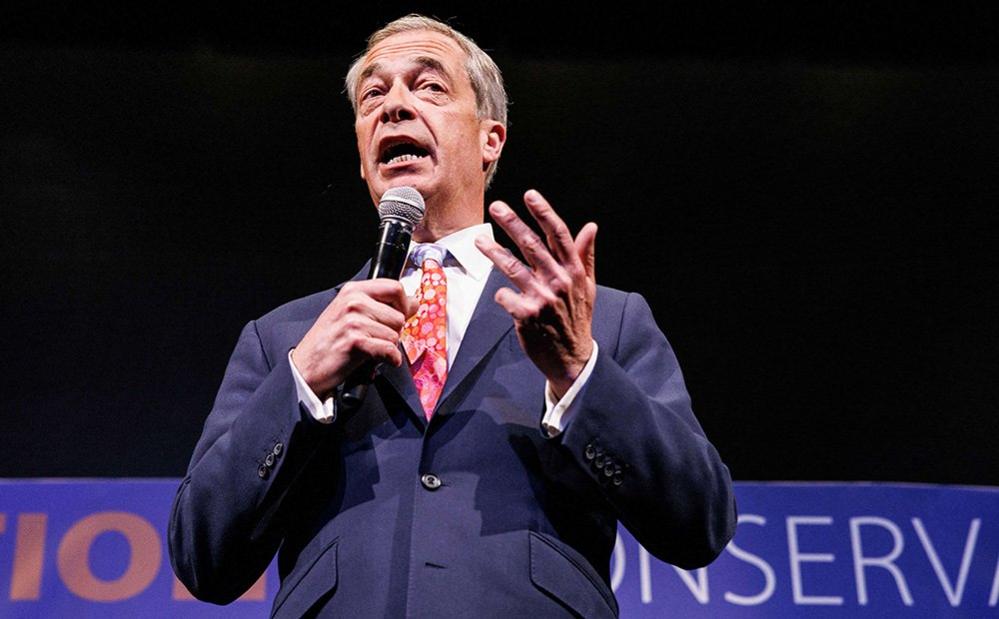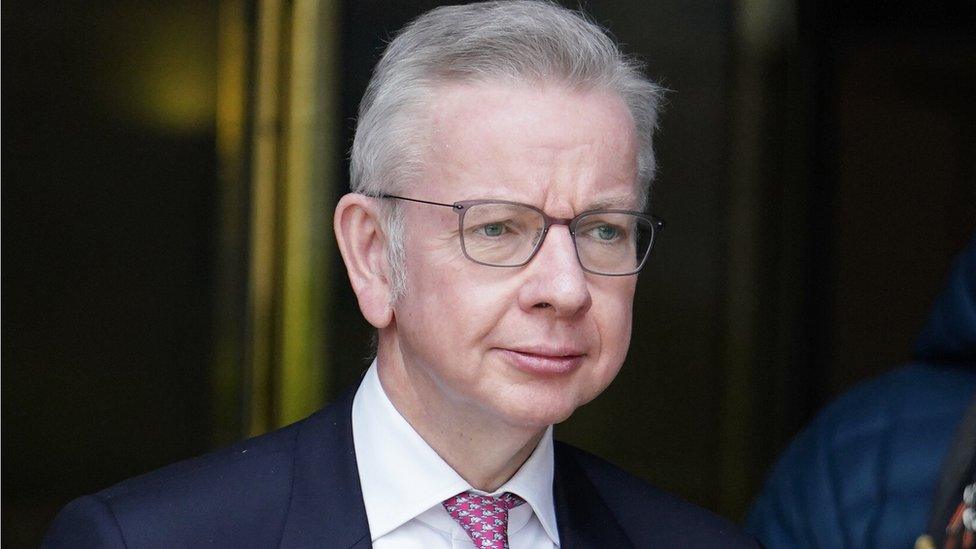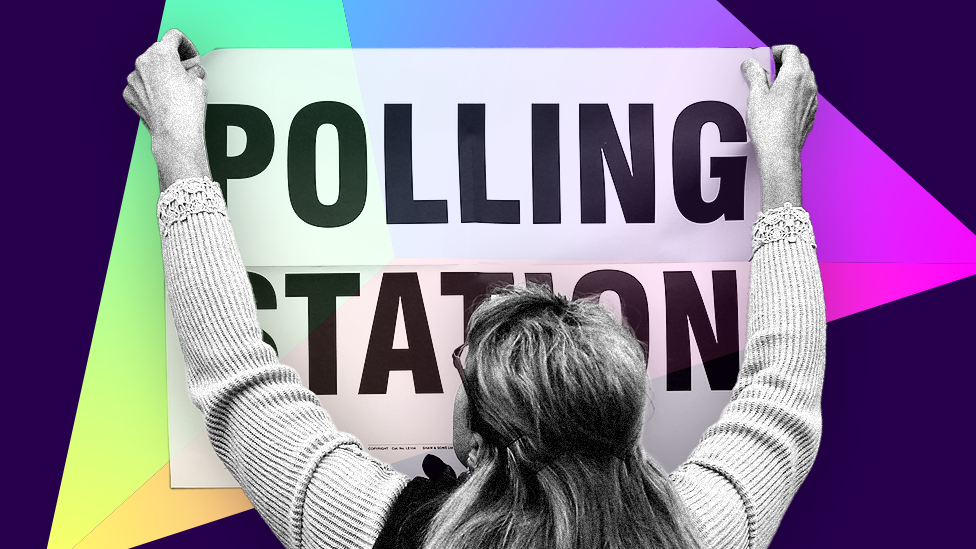Nigel Farage rules out standing for Reform UK in general election
- Published

Reform UK founder and honorary president Nigel Farage has announced he will not stand in the general election.
There was speculation he would be unveiled as a parliamentary candidate by Reform leader Richard Tice.
But Mr Farage told the BBC six weeks was "not long enough" to fight a constituency while campaigning for the party around the country.
Launching Reform's campaign, Mr Tice said it would field candidates in all but 20 of the UK's 650 constituencies.
The party would contest 630 seats across England, Scotland and Wales "no ifs, no buts", he said.
Mr Farage said he would be "100 per cent behind" Mr Tice - travelling across the country, speaking at rallies and doing interviews. "You'll see a lot of me," he added.
Earlier, in a statement posted on X, he said he would "do my bit to help" the party, but now was "not the right time to go any further than that".
Mr Tice will stand in Boston and Skegness in Lincolnshire, where Conservative MP Matt Warman had a majority of 25,621 in the 2019 general election.
Reform currently has one MP, Lee Anderson, who defected from the Tories in March.
"Contrary to what all the commentators say, the likes of my good friend Lee Anderson and myself, we are going to win seats," Mr Tice told the party's campaign launch in London.
He played down Mr Farage's decision, saying he would "be helping out significantly" during the election campaign.
The GB News presenter is cancelling his show on the channel for the duration to free up time for campaigning.
Calling it "the immigration election", Mr Tice hit out at high levels of net migration, "establishment experts" and the "weak, feeble politicians who have broken Britain".
Rishi Sunak had "bottled it" and decided to "cut and run" by calling a summer election instead of holding on for the autumn, he argued.
He said the prime minister was "absolutely terrified" by Reform's upward progress in the opinion polls, "terrified as to where this may end up".
The latest polls put the party at around 11% of the national vote, ahead of the Liberal Democrats, and Reform says it will have enough candidates to contest every seat.
Reform insists it is targeting both Conservative and Labour voters, but evidence from recent by-elections suggests the Tories have the most to fear from the party, which Mr Farage led from 2019 to 2021 when it was known as the Brexit Party.
In the last general election in 2019, it did not stand in constituencies won by Conservatives in 2017.
US election 'huge'
Mr Farage had previously said he would not make an eighth attempt to become an MP at Westminster under its first-past-the-post electoral system.
In his statement, external, he suggested his priority would be helping his friend, Donald Trump, return to the White House.
He said he had "thought long and hard as to whether I should stand in the upcoming general election".
"As honorary president of Reform UK, I am fully supportive of Richard Tice's leadership and urge voters to put their trust in him and Lee Anderson.
"Important though the general election is, the contest in the United States of America on November 5 has huge global significance.
"A strong America as a close ally is vital for our peace and security. I intend to help with the grassroots campaign in the USA in any way that I can.
"The choice between Labour and the Conservatives is uninspiring, and only Reform have the radical agenda that is needed to end decline in this country."
The Reform UK leader says Rishi Sunak "bottled it" by calling a surprise general election in July.
Reform has been particularly critical of the Conservatives on the issues of immigration and net zero.
Many Tories fear it could put a significant dent in Rishi Sunak's hopes of a return to Downing Street. But they are likely to be relieved Mr Farage has decided against taking on a more prominent role, given his high public profile.
Former cabinet minister Sir Jacob Rees-Mogg said: "The fact that he's not a candidate for an opposition party is inevitably helpful for the Conservatives."
Asked about the Conservative claim that a vote for Reform was, in effect, a vote for Labour, Mr Farage told the BBC that whichever of the two largest parties was in power had "almost no impact on the lives of ordinary folk" because there was almost no difference in policies between them.
"I hope Reform can become embedded in the Westminster system and become a genuine vote of opposition to a Labour Party that will have no honeymoon," he added.
Mr Tice took over as Reform's leader when Mr Farage decided to step back from frontline politics in 2021 in the aftermath of the UK's withdrawal from the European Union.
At the election launch, former MEP Ben Habib, a candidate in Wellingborough, appeared to have a dig at Mr Farage's latest decision, saying: "For any political movement to succeed, it needs a leader who is prepared to absolutely stay the distance and make the fight."
Mr Tice had "the moral courage not to vacate either when the going gets tough or when it might suit him," he added.
Asked if he was referring to Mr Farage, Mr Habib replied: "You interpret as you see fit. In any walk of life, you have to stay the distance."
Mr Farage previously led the UK Independence Party from 2006 to 2009 and 2010 to 2016, and was Member of the European Parliament (MEP) for South East England from 1999 until the UK left the EU in 2020.
A prominent Eurosceptic from the early 1990s, when he left the Conservative Party following the signing of the Maastricht Treaty which furthered European integration, he was seen as a key figure in the decision to hold the Brexit referendum in 2016.
Mr Farage has stood for the UK Parliament unsuccessfully seven times, most recently for South Thanet in Kent in the 2015 general election.
Westminster's first-past-the-post system has repeatedly scuppered his chances, whereas the proportional representation used for the European Parliament helped him enjoy a long career as an MEP.
While working as a presenter on GB News, he took part in 2023 in the reality TV series I'm a Celebrity...Get Me Out of Here!, finishing in third place.

What questions do you have about the general election?
In some cases your question will be published, displaying your name, age and location as you provide it, unless you state otherwise. Your contact details will never be published. Please ensure you have read our terms & conditions and privacy policy.
Use this form to ask your question:
If you are reading this page and can't see the form you will need to visit the mobile version of the BBC website to submit your question or send them via email to YourQuestions@bbc.co.uk, external. Please include your name, age and location with any question you send in.
- Published23 May 2024

- Published23 May 2024

- Published3 July 2024

- Published4 July 2024
